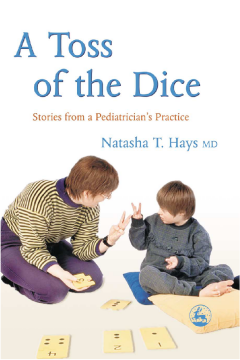
Additional Information
Book Details
Abstract
Our hopes and dreams for our children are deeply felt by all parents. When we realize our children cannot fully achieve what we had hoped for them, it is a grief that tears at our hearts… The bottom line is that having children is just a toss of the dice. We all carry quite a few seeds for genetic disorders in our chromosomes.'
- from Chapter 1 of A Toss of the Dice
Told from a pediatrician's perspective, A Toss of the Dice reveals what it is like to diagnose and treat children with developmental problems. Natasha T. Hays uses stories from her pediatric practice to illustrate the challenges faced by children with different types of special needs, including autism, bipolar disorder, genetic syndromes, cerebral palsy, attention deficit hyperactivity disorder, and giftedness.
In this highly readable book, Hays combines stories of inspirational children with useful medical information and treatment options. A Toss of the Dice shows the human perspective of the interaction between doctor and patient. It informs parents, teachers, doctors and health professionals as well as the general reader.
Natasha T. Hays is a pediatrician and trained stuntwoman. She has been working for the Morganton Developmental Evaluation Center in North Carolina, USA for 17 years, treating patients with a variety of special needs including learning disabilities, ADHD, autism, cerebral palsy, neurological disorders, and mood disorders. Natasha is married to Phil and they have two children, Ariel and Alexander.
Table of Contents
| Section Title | Page | Action | Price |
|---|---|---|---|
| Prelims (Contents, Foreword by David Kaimowitz, Acknowledgements, Figures, Tables, Boxes, Examples, Abbreviations and acronyms) | |||
| PART I - INTRODUCTION AND CONCEPTS | |||
| 1. Introduction | |||
| 2. Economic concepts for participatory forest management | |||
| PART II - THE ECONOMIC STAKEHOLDER ANALYSIS TOOLBOX | |||
| 3. Identification and characterization of the stakeholders; Understanding the decision-making context and the role of economics | |||
| 4. Identification and physical quantification of costs and benefits | |||
| 5. Valuation of costs and benefits | |||
| 6. Economic comparison of the decision-making alternatives | |||
| 7. Participatory analysis and monitoring; Summary guidance points | |||
| Back Matter (Appendices 1 - 6, Glossary of economic terms in the context of forest resource economics, References, Index) |
